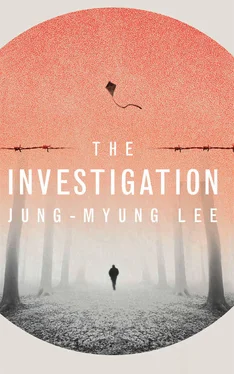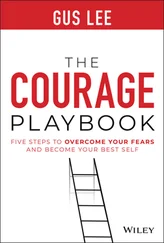I felt cowed by Director Morioka’s gentle expression and melodic voice. ‘Sir,’ I began hesitantly. ‘The symptoms weren’t false. The prisoners who received infusions are in pain. What the patient is feeling has to be the most accurate documentation of his pain.’
Director Morioka smiled. ‘Will you be my guest tomorrow in the infirmary? Your misgivings will be put aside when you see for yourself how scientifically and hygienically we conduct the medical treatments.’
I nodded, mute.
The next day, at two in the afternoon, I escorted thirty prisoners to the infirmary. We stopped, as always, in front of the auditorium. Dong-ju’s gaunt cheeks were flushed with vitality as he stood listening to the singing. At the end of the song I led the prisoners down the corridor, their shackles dragging behind us.
In the infirmary a doctor wearing silver glasses motioned for me to follow him. He opened the door to the infusion room, revealing six cots shielded by white curtains on either side of the room. ‘The infusion room is the height of hygiene and convenience,’ he explained.
In a clear, high voice a nurse called out six numbers. Prisoners filed in and each took a cot. Nurses approached them and, with precise movements, found the veins and inserted the needles in their thin arms. After the treatment the men rested. The doctor explained to me that they might experience dizziness or muscle spasms if they moved right away. I tagged along behind him as he moved slowly between the cots.
‘This medication will give them more vitality and help prolong their lives,’ he said and opened the door at the other end of the room. I followed him in, feeling like Alice hurtling down the rabbit hole. He sat down at the desk, which was stacked with medical files, and nodded at the young prisoner, an interpreter, sitting stiffly in a chair in the corner.
The doctor flipped through the list and shouted, ‘531! Enter!’
The interpreter followed suit in Korean.
A man with sunken eyes walked in.
The doctor didn’t look up from the chart. ‘Any uncomfortable symptoms?’ he snapped.
The patient blinked his eyes, waiting for the interpreter to finish translating. ‘Nowhere in particular,’ he replied nervously. ‘I’m always uncomfortable. My head feels foggy and I’m tired, but I can’t sleep at night. I haven’t eaten much. I can’t digest anything, anyway. I have the runs, you see.’
The doctor wrote down the symptoms on the chart. He laid down his pen and took out a stopwatch and a piece of paper from the desk drawer. He turned to me and explained that he would conduct a mental-agility test that would reveal any damage to brain function. Apparently, performance of arithmetic was the most effective neurological test, as it required instant recall, strong focus and accurate maths skills.
He handed the piece of paper to the prisoner and pressed a button on the stopwatch. ‘Begin!’
The patient started on the problems. They were mostly double-digit additions and subtractions. The stopwatch ticked through the silence. One minute later, the doctor told him to stop. The patient put down the pen with a tired expression. The doctor checked the answers, recorded the number of questions solved and the number of accurate and inaccurate answers.
‘What’s the date today?’
‘January 1945.’
‘Where are we?’
‘Fukuoka Prison. ’ The patient was speaking hesitantly now.
The doctor cocked his head and wrote something down on the chart. ‘Where are you from?’
‘Uiju, on the Korean peninsula.’
‘When will you be released?’
The prisoner paused. ‘1946?’
The doctor wrote, ‘Doesn’t clearly remember when he will be released.’
The questioning continued. The prisoner hesitated a few times and then the doctor compared the results with those of a previous test.
‘How am I, Doctor?’ the patient interrupted. ‘Am I getting better?’
‘You know that things get worse before they get better. You’re getting a special infusion, so it’ll take some time for you to get used to it. You’ll improve gradually, so be patient.’
The doctor looked at him sympathetically as the prisoner left the room. ‘He answered twelve problems in a minute. He got nine right. He completed one less than last week and he got one more wrong. On the memory test, he answered two fewer than last time and hesitated twice more. It’s not good. Like you said, it must be the side-effects of the infusions.’
‘Then shouldn’t we halt them immediately?’
The doctor shook his head in exasperation. ‘Look here, Soldier! Do you even understand what we’re doing? The medical team will take care of this, so just concern yourself with your own job.’ He then explained that the infusions were part of a larger research project — they were aiming to ameliorate the fatality rates of soldiers and air-strike victims — and they were testing this new medication on the prisoners, which would make them feel stronger. They were also doing all they could to eliminate side-effects. He concluded by saying that there would be no need for research if medications didn’t have side-effects and never failed.
Dong-ju entered the room. His cheekbones protruded starkly over his gaunt cheeks, and his pale skin was stretched grotesquely over his skull.
The doctor opened his chart. ‘Prisoner number!’
‘I don’t remember.’
‘Name?’
‘Yun Dong-ju.’
The doctor looked up at him in surprise. ‘Your Japanese name!’ he snapped.
‘I don’t remember.’
The doctor gave Dong-ju the arithmetic test. Dong-ju took the pencil and started working on the problems. One minute later, the doctor pressed the stopwatch.
‘Home town?’
‘Mingdong village in Jiandao Province, Manchuria,’ Dong-ju replied. ‘It’s a lovely little village surrounded by mountains. In the spring, azaleas, cherry blossoms and peonies bloom and soft catkins cover the river banks.’
‘That’s enough,’ the doctor said, cutting him off. ‘This is not the time to reminisce about your birthplace. When will you be released?’
‘30 November 1945.’
‘Who is the Emperor of Japan?’
‘I don’t remember.’
The doctor’s mouth flickered with a tiny spasm. ‘What words can you recall?’
Dong-ju closed his eyes. Smiling, he answered, ‘Sky, wind, stars, poetry.’
The doctor wrote the words down. ‘What is the multiplication table for nine?’
Dong-ju slowly recited the numbers with a blank expression: ‘9, 18, 27, 36, 45, 54, 63, 72, 81, 90, 99. ’
‘Enough. You may leave.’
Dong-ju turned round slowly, his thin, stooped back as unsightly as his gaunt face. His body was slowly betraying him.
The doctor turned to me. ‘His memory and his arithmetic are perfect. He solved many more questions than anyone else and he didn’t give any wrong answers. This is an example of someone adjusting well to the infusions. He’s had no side-effects to worry about.’
I couldn’t believe my ears. ‘But his memory is faulty. He couldn’t remember his Japanese name or his prisoner number.’
‘Ah, that. You, of all people, should know that you have to be alert and to sort out made-up answers when examining prisoners.’
‘Made-up answers?’
‘I mean an intentionally wrong answer, or an answer that has nothing to do with the question posed. He didn’t tell us his Japanese name because he didn’t want to. Not because he couldn’t remember. And it was the same with his prisoner number.’
‘Why would he conceal what he remembers?’
‘You must be well aware of this tactic! It’s a way to deny his crime. He’s avoiding acknowledging it by erasing his prisoner number from his memory. He’s not admitting to the fact that he has a Japanese name. It’s typical of an intelligent mind.’
Читать дальше












